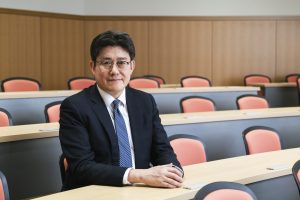April 2024
Facing challenges that demand well-designed public policy, including rapid aging, population decline, global warming, disruptive technological advances, the globalization of economic activities, and changes in the national security environment. Every era has its challenges, but as the complexity of these challenges has increased, so too have the methods for addressing them. As a result, the breadth and sophistication of the knowledge and skills required for policymakers have expanded. With the development of artificial intelligence, the ability to answer questions within a narrow scope has become obsolete. Instead, the capability to formulate appropriate questions for challenges and find solutions has become crucial.
Previously, the main actors in public policy were officials in governments, but now it is impossible to address public policy challenges without considering the roles of private corporations and non-profit organizations. As problems become more complex and various actors engage in public policy challenges, the ability to collaborate with others and tackle problem-solving has never been more important. The Graduate School of Public Policy (GraSPP) of the University of Tokyo provides a venue where students can intensively acquire a broad range of knowledge and leadership skills over two years, preparing them to thrive in various fields.
GraSPP offers various academic courses. While each course has its own set of classes, they all share the common goal of developing individuals who can formulate policies and exhibit leadership according to their roles within organizations as public policy professionals. To achieve this goal, we offer systematic classes taught by world-class researchers and front-line practitioners based on law, political science, international relations, and economics, aimed at tackling issues that cannot be resolved within a single academic discipline. Furthermore, to persuade many stakeholders and implement desirable policies, presenting the right evidence is essential. Therefore, one of our distinctive features is offering enriched classes in data analysis to cultivate public policy professionals skilled in this area. Additionally, we provide courses that develop soft skills necessary for policy implementation, such as negotiation and leadership.
The backgrounds of students entering each course are diverse, including working professionals with practical experience. Our curriculum is designed to allow students to master content from basic to advanced levels over two years, catering to students with diverse backgrounds. Taking advantage of this feature, students can specialize in different fields from their undergraduate studies and change their career direction by advancing to GraSPP. For instance, one could study foreign history during their undergraduate years, advance to the International Public Policy course, and pursue a career in diplomacy. Alternatively, someone who studied engineering might enter the Economic Policy course and engage in a career related to economic policy.
GraSPP is international. Although we have a relatively small cohort of 135 students per year, about half are international students from around 30 countries. To accommodate this diverse student body, about half of our classes are offered in English. Moreover, the University of Tokyo is the only graduate school in Japan that is a member of the Global Public Policy Network (GPPN), which includes major international public policy schools such as Columbia University, the London School of Economics, Sciences Po, and the National University of Singapore. We offer dual degree programs with nine schools, including GPPN member schools. We also have a Campus Asia program for studying public policy and international relations in East Asia through dual degrees or exchange programs with Peking University, Seoul National University, and the National University of Singapore. Participating in these dual degree programs allows students to earn master’s degrees from both the partner university and the University of Tokyo within two to two and a half years. In the 2023 academic year, we sent out 13 students through the dual degree programs and welcomed 19. Exchange studies with partner schools are also actively encouraged, with 7 sent and 16 received in 2023. Utilizing the credit recognition system, students can complete their studies at GraSPP within two years while studying abroad.
The need for knowledge and skills for policy formulation, evaluation, and implementation is increasingly sophisticated, and opportunities for doctoral graduates are expanding. To meet this social demand, GraSPP offers a doctoral program. The program aims to cultivate advanced doctoral talents with high-level research abilities in law, political science, international relations, and economics, as well as interdisciplinary and practical skills. It focuses on producing leaders in global public policy in areas such as international development and finance, security, and science and technology policy. It also nurtures researchers who can delve into cutting-edge practical issues, deepen their research in their respective fields, and pioneer new academic disciplines.
GraSPP is committed to improving public policy by nurturing internationally active leaders and advancing academic research of international standards that provide solutions to real-world challenges. We look forward to welcoming those who share our goals to our community.

Daiji Kawaguchi
Dean, Graduate School of Public Policy, The University of Tokyo


